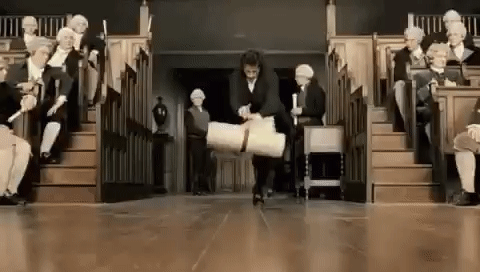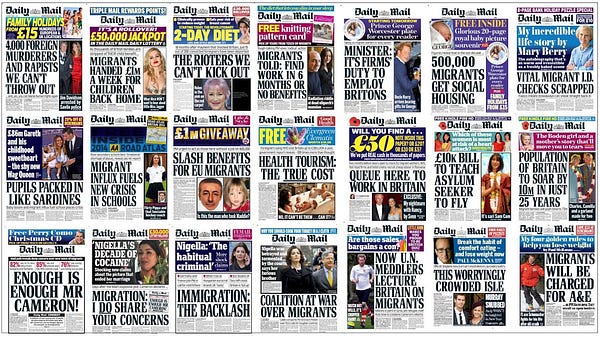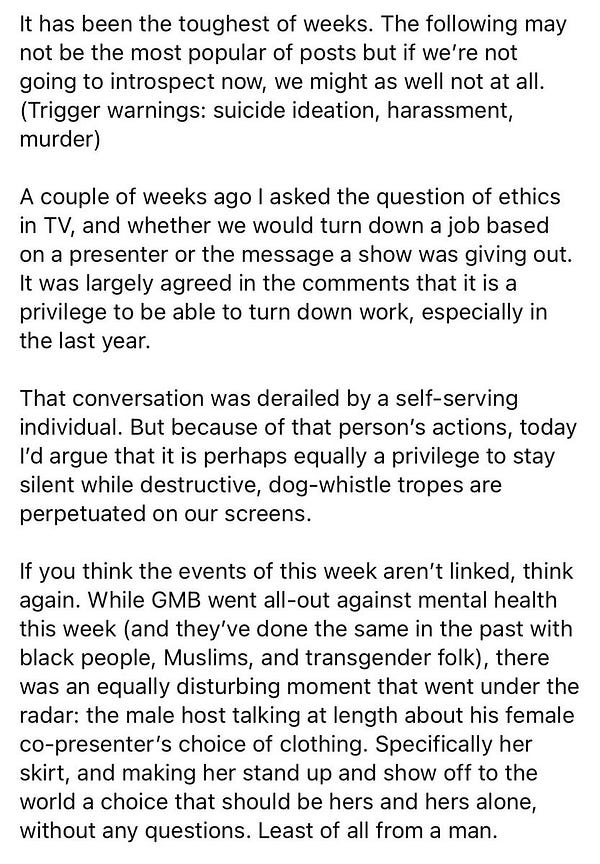The British Press is Broken. Here’s How To Fix It.
In the same week the press comes under harsh scrutiny, media activists remind us that they’re armed with tools for change.
For any activist, a return of focus to your campaign is bittersweet because it almost always means that something has gone badly wrong. In the week before 2021’s Media Democracy Festival, the fallout from Meghan and Harry’s Oprah interview has seen an explosive reaction in and around the tabloid press, throwing a spotlight on the case for the media reform movement.
The couple illuminate a particularly high-profile version of some of the media industry’s most pernicious effects, subtle and overt. And in their responses, the press and the public have largely proven the couple’s point.
The last several decades have shown that the tabloid press has functioned in an abusive, and at times criminal, manner. The first, macro-reason for this is that the British press is made up of largely British people, whose culture is embedded with a storied history of capitalist imperialism. Other, more specific reasons are that the press is unregulated, underfunded, understaffed, and unrepresentative.
A string of events surrounding Piers Morgan’s now-infamous exit from the GMB studio (something he’s previously mocked Alex Beresford and others for doing) illustrate a wider dysfunctional industry culture.
In the past few weeks, Morgan and GMB’s home channel ITV had come under fire for failure to deal with bullying; not of celebrities or royals, but of their colleagues.
Both ITV and Morgan brushed off the allegations, as freelancers reminded them of the industry-wide ‘coalition for change’ project — with a clear anti-bullying, mental health focus — that they signed up to last year. This was the context within which Morgan continued to lash out at Markle, and walked off set when criticised for doing so.
After the Oprah interview, alongside defensive denials by members of the press that there is even an issue to be raised, Morgan yet again gave a platform to Markle’s father who has a history of disparaging her in the press. Mr. Markle went on to openly blackmail his daughter, unchallenged by Morgan, saying that every 30 days she won’t talk to him he will “do another story for the press”.
While the issue is far wider than just the royal family, let’s not forget that after Princess Diana’s death the press promised a culture change. This is from 2004:
In a deal struck following the death of their mother, Princess Diana, the press agreed to leave the young royals alone until they completed full-time education, in return for regular access to them via official photocalls and interviews.
But last year the editor of the News of the World, Andy Coulson, complained to a parliamentary inquiry that St James’ Palace had fallen down on its side of the bargain. Frustrated by lack of official access, the tabloid had published pictures of Prince William carrying Tesco shopping bags in his university town of St Andrews.
Subsequently, Prince Charles’s private secretary, Sir Michael Peat, admitted the press had not been given sufficient access to Prince William and promised to provide information at least twice a term in an attempt to defuse the situation.
And newspaper editors have argued that Prince Harry has made himself fair game for photographers by cultivating a party lifestyle.
Of course, plenty of citizens and journalists have come out in support of the couple, and the conversation into press misconduct has been reinvigorated. The last time I looked, though, The Discourse did not have a history of reliably fixing socio-economic and cultural issues.
So ahead of this week’s Media Democracy Festival, here are several issues that activists will be discussing which could see real, lasting change for the industry.
Regulation
British newspapers have long-avoided being legally regulated and to this day practice ‘self-regulation’. 2011’s Leveson Inquiry into the standards and ethics of the British press — a direct result of, but not limited in scope to, the phone-hacking scandal — recommended an overhaul of the existing regulator: the Press Complaints Commission (PCC).
But its replacement, the Independent Press Standards Organisation (IPSO), to which most UK nationals and media groups are now subscribed, does not comply with the inquiry's recommendations.
It’s easy to forget how spectacularly the press’ self-regulation has failed. When the phone-hacking story was first uncovered by The Guardian:
The PCC’s initial investigation into the Guardian’s investigation concluded there was “no new evidence” of phone hacking by the News of the World beyond the activities of a single reporter, Clive Goodman, and that there was “nothing to suggest that the PCC was materially misled” in an earlier 2007 inquiry. The regulator chose to criticise the Guardian, saying its story “did not quite live up to its dramatic billing”.
A couple of years later it turned out that the tabloid press had in fact been hacking phones of both public and private citizens for years, and the story went stratospheric. The intimate and family relationships of many public figures were ruined. It came to light that the voicemail of teenager Milly Dowler was hacked shortly after she went missing; an act that caused the police and her parents to believe that she was alive, affecting the course of their investigation in those crucial first few days.
In public discourse, it‘s largely forgotten that the second part of the inquiry, ‘Leveson 2’, was due to investigate further the interactions between press and police. It was shut down by the Conservatives in 2017.


Leadership
Reflection and conversation is important for moving towards understanding and accountability, but it’s not enough. People from marginalised groups, who have historically borne the brunt of press misconduct, need to be in positions of power to bring lived experience and depth of understanding to the industry.
The people making decisions need to be diverse in experience and approach otherwise change will be cosmetic, if at all. And ‘conversation’ and ‘reflection’ (in other words, the extent of self-regulation) has been going on for a long time. In 2015, the UN was moved to call the UK tabloid output ‘hate speech’, but even international contributions to the conversation has not produced an accountable industry.


Last week we wrote about the lack of accountability for the Conservative government’s wrongdoing, and why spending £2.6 million on a press briefing room to “enhance transparency” wouldn’t help. Similarly, the £5.4 million the government spent on the Leveson Inquiry showed leadership in its initial concept, but resulted in few changes in the persons leading.
Funding
One thing that very much has changed in the years since Leveson is ever-reducing revenue, making journalists’ jobs harder to do, and less secure. If you’ve been following our blog and/or newsletter, you’ll know how obsessed we have been with the legislative cases against Facebook and Google. They now have a ‘duopoly’ over the ad-tech industry that previously paid for expensive reporting.
The rise of tabloid fodder and ‘churnalism’ is due in part to this decline in funding. Accurate reporting of information in the public interest is expensive, whereas copying press releases/writing hot takes/bashing out clickbait not only brings in outrage clicks and therefore desperately needed revenue, but is significantly cheaper in the first place.
Without a new funding model, journalism in the public interest will continue to shrink away when we need it more than ever. Australia made a legislative move towards financial change, however, it did not include culture change and most of the money went into, you guessed it, Mr. Murdoch’s pocket.
Worker Protection
Just a couple of days ago, less than a month after its acquisition by BuzzFeed, 70 HuffPost journalists were fired and its Canadian and UK newsrooms shut down. As well as the wider funding issue that has been worsening for decades, the pandemic has taken a sharp toll on newsrooms this year. Less funding will always mean less protection for workers — HuffPost and BuzzFeed both have unions.
The financial situation, and journalists’ working conditions within it, have led to a wave of unionisation across the media industry over the last five years, something Chompsky has started tracking.




Pluralism
Ultimately, of course, this is about power. The UK media industry, like its global compatriots, is owned by just a handful of conglomerates. There are a number of new, independent outlets which are doing excellent work towards greater representation and/or media democracy, for example: gal-dem, The Bristol Cable, Hacked Off, the Independent Media Association, and the Media Reform Coalition, amongst many others.
(Disclosure: I’ve been a board member of The Bristol Cable, and I helped set up the Independent Media Association under its previous title, The Media Fund.)
The internet promised to democratise the media, and there are echoes of this in our level of access to information, ability to communicate across the globe, developments in UX, etc. But those ways in which power has disseminated to the average person is mirrored by an increased concentration of power at the top, in the hands of fewer men than ever.
From Sunday 14 March 2021, for a week the Media Reform Coalition is hosting the Media Democracy Festival online. It’s simply an unhappy accident that this week would be one to show how desperately media reform is needed.
Check out their full programme, and sign up to follow our blog and weekly newsletter, to join the movement to build a better industry.






